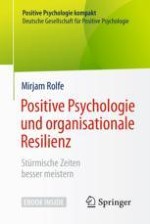2019 | OriginalPaper | Chapter
3. Resiliente Organisationen: Was Unternehmen krisenfest, gesund, agil und wirksam macht
Author : Mirjam Rolfe
Published in: Positive Psychologie und organisationale Resilienz
Publisher: Springer Berlin Heidelberg
Activate our intelligent search to find suitable subject content or patents.
Select sections of text to find matching patents with Artificial Intelligence. powered by
Select sections of text to find additional relevant content using AI-assisted search. powered by
